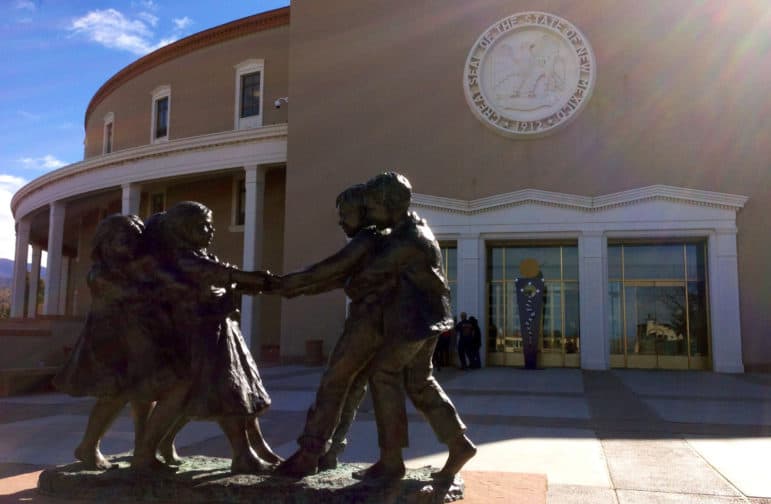
Heath Haussamen / NMPolitics.net
A statue outside the Roundhouse in Santa Fe.
COMMENTARY: To be clear, state-level policymakers in New Mexico should have addressed the federal government’s REAL ID Act requirements sooner. That act sets security standards that must be met for state-issued driver’s licenses to get people on planes and into federal facilities.
States were initially supposed to comply by the end of 2009. Many, including New Mexico, have been granted annual waivers ever since.

Heath Haussamen
Not this time.
In October, the U.S. Department of Homeland Security (DHS) rejected New Mexico’s request — and requests from some other states — for another waiver. DHS has given N.M. Gov. Susana Martinez and state legislative leaders until Sunday to agree on a fix that would bring the state into compliance.
If they don’t, New Mexico licenses may no longer be valid for some federal purposes, DHS says.
The primary holdup has been the annual battle in the N.M. Legislature over repealing the state law that allows immigrants without legal status to obtain licenses — which is the main reason New Mexico’s licenses don’t comply with REAL ID.
The impact of the action threatened by DHS appears to be minimal, for now. DHS plans to continue allowing non-compliant IDs at airports for the time being.
And while DHS says people with non-compliant driver’s licenses “will need to show an alternative form of ID when visiting federal facilities, nuclear power plants and military bases,” that appears to not always be true. At least some bases are setting their own rules. White Sands Missile Range currently plans to continue accepting New Mexico licenses even if DHS deems them non-complaint.
And many people who need to get onto military installations are employees and use base IDs, not driver’s licenses, for access.
Still, there’s no question New Mexico’s policymakers need to act quickly. DHS could start requiring REAL ID-complaint licenses to board planes later this year. Federal facilities might not allow non-compliant driver’s licenses indefinitely. Some may not allow them at all.
Dealing with immigration
It’s in some ways understandable New Mexico got to this point. A few other states, like Missouri and Minnesota, have thumbed their noses at the federal REAL ID requirements for ideological reasons, enacting laws specifically forbidding compliance.
New Mexico, on the other hand, hasn’t expressed any real objection to REAL ID. It’s just been busy dealing with a another matter — immigration.
Since 2003, New Mexico has allowed immigrants living in the state without legal status to obtain driver’s licenses. It’s our attempt to address problems created by the federal government’s inability to reform America’s broken immigration system.
Martinez took office promising to repeal that law and has worked hard to do so ever since, without success.
Her pledge was never realistic. It’s one thing to debate up front whether to give licenses to people without legal status. But once such immigrants have licenses, it’s another entirely to consider taking driving privileges away from people who need to get to work, the grocery store, medical facilities, and schools.
Democrats who defended keeping the 2003 law intact were also being unrealistic. The feds were going to enforce REAL ID eventually. The vast majority of people living in the state — those who are citizens or have another type of legal status — need an ID that meets federal requirements to move around the country, which can’t happen as long as the state’s driver’s license law stays as is.
The solution
The solution already exists in states like Utah, where there are two tiers of licenses — one a REAL ID-compliant license and the other a “driving privilege card” for people who, for whatever reason, don’t provide Social Security numbers or other proof of lawful residence.
New Mexico finally understands that it must create a two-tier licensure system. Even Martinez spoke Thursday about compromise.
But we need time to figure out the details. Proposals backed by Republicans and Democrats would both likely strip some current license holders who lack legal status of their ability to drive legally. The Republican plan would probably take licenses away from more immigrants than what Democrats propose.
DHS has demanded that Martinez and legislative leaders negotiate a compromise by Sunday. Nine days after that, New Mexico’s Legislature meets in a 30-day session.
DHS should grant an extension of just a few weeks to allow consideration of the two-tier license proposal by all 112 lawmakers during the session instead of a few officials beforehand. New Mexico is in the process of making a big change that could affect the livelihoods of lots of people living here. Good policymaking requires fiscal analysis, deliberation, and public input. A handful of elected officials negotiating on the fly on deadline without public scrutiny are likely to create bad policy.
If the Legislature doesn’t act in the 30-day session that begins Jan. 19, I support DHS coming down hard on New Mexico. But this close to the session, I hope DHS respects our state’s voters enough to give their elected officials one last chance to fix this mess.
The session ends at noon on Feb. 18. Martinez must act on legislation by March 9. Give us until that day to enact legislation that’s REAL ID compliant.